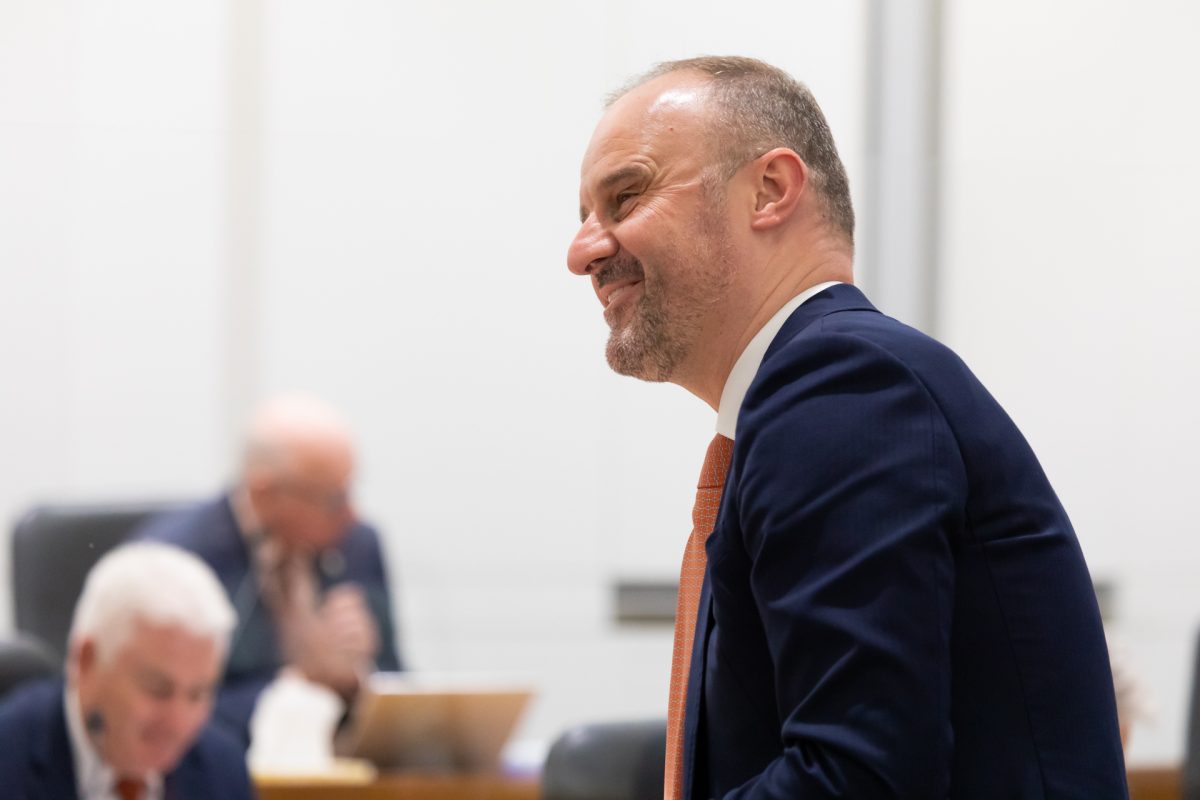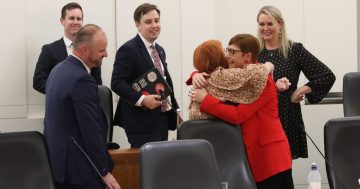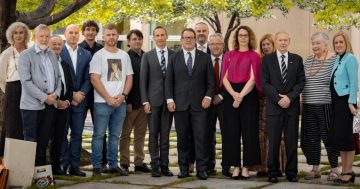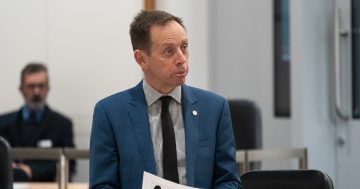
Chief Minister Andrew Barr outlined this year’s priorities for the ACT Government in his Ministerial Statement. Photo: Michelle Kroll.
A year of “significant social policy reforms”: that’s what we’ve been told to expect for 2023 as the Labor-Greens Government reaches the mid-way point of its elected term.
Chief Minister Andrew Barr outlined the priorities for the government during his Ministerial Statement at the first sitting of the Legislative Assembly for the year.
First off the bat is consultation opening on voluntary assisted dying, which the ACT finally has the right to decide.
The government aims to have legislation ready to introduce towards the second half of the year.
Two large pieces of nation-leading policy to be passed this year are the decriminalisation of possessing small quantities of certain illicit drugs and raising the minimum criminal age of responsibility.
Mr Barr said the ACT approached drug use as a health issue, not a criminal one.
“Decriminalising the possession of small quantities of the most common illicit drugs will provide those battling addiction with the help they need, without shame or the risk of criminal prosecution,” he said.
“While nation-leading, this isn’t radical.”
The legislation will come into effect in late October, with the government working with stakeholders to implement oversight arrangements, training frontline workers, and developing information material in conjunction with police, the alcohol and drug sector, policy experts and people with lived experience of drug use.
“The ACT Government invests more than $26 million each year in alcohol and drug treatment and harm reduction services in the ACT. This legislation will enhance our progressive and informed approach,” Mr Barr said.
This year, laws will also be introduced to raise the minimum criminal age of responsibility to 12 and then to 14 in two years.
Mr Barr said the stepped approach would help the government put support services in place to support children and young people who might otherwise enter the criminal justice system.
“We’ll be getting to these kids early, before they start engaging in more serious harm,” he said.
“But in circumstances of the most serious and harmful actions, the community can be assured the criminal law will still apply to offenders 12 years and over.”
This year, an amendment to the ACT’s Discrimination Act will be debated with plans to better align the policy with the Human Rights Act to promote greater social inclusion and respect for diversity.
“These changes also include a significant shift away from a reactive approach to addressing discrimination, to taking reasonable and proportionate steps to embed equality in all aspects of public life,” Mr Barr said.
He also foreshadowed an executive motion that will be brought to the Assembly tomorrow (8 February) to affirm support for the Federal Government’s Voice to Parliament and to endorse a community engagement campaign for Canberrans ahead of the referendum.
“Canberrans have a long history of voting ‘yes’ for positive and inclusive change,” Mr Barr said.
“My ambition is for the ACT to have the highest ‘yes’ vote in the country, just like we did with the marriage equality vote in 2017 and the Republic referendum in 1999.
“The ACT Government looks forward to contributing to what will be a historic vote, and I look forward to outlining the ACT’s role in the referendum in more detail during the executive motion tomorrow.”
Mr Barr said work would also continue in the planning and housing affordability sector, with feedback to be considered for proposed planning reforms through a new Planning Bill.
He acknowledged land is limited in the Territory but argued the things that made the ACT a “great place to live” couldn’t exist if “we endlessly sprawl”.
“That’s why we are aiming to achieve a ‘gentle urbanism’: building more affordable homes to own and rent in locations where people want to live, while retaining Canberra’s distinct character,” Mr Barr said.
As for housing affordability, the government recently announced the formation of a new Office of the Coordinator-General for Housing, and more plans to be considered to address this issue further.
Investment continues in light rail and electric buses, and a move away from the weight-based registration system.
The introduction of free medical and surgical abortions up to 16 weeks will be enacted.
Overall Mr Barr said the ACT Government would focus on ensuring Canberra remained a great place to live, work, invest, study and visit.
“We know that Canberrans take pride in belonging to an inclusive and caring city,” he said.
“That’s why we are committed to delivering significant social reform that will strengthen our community.
“Exploring and delivering complex policies and legislation isn’t easy; however, we are getting on with the job.”





















